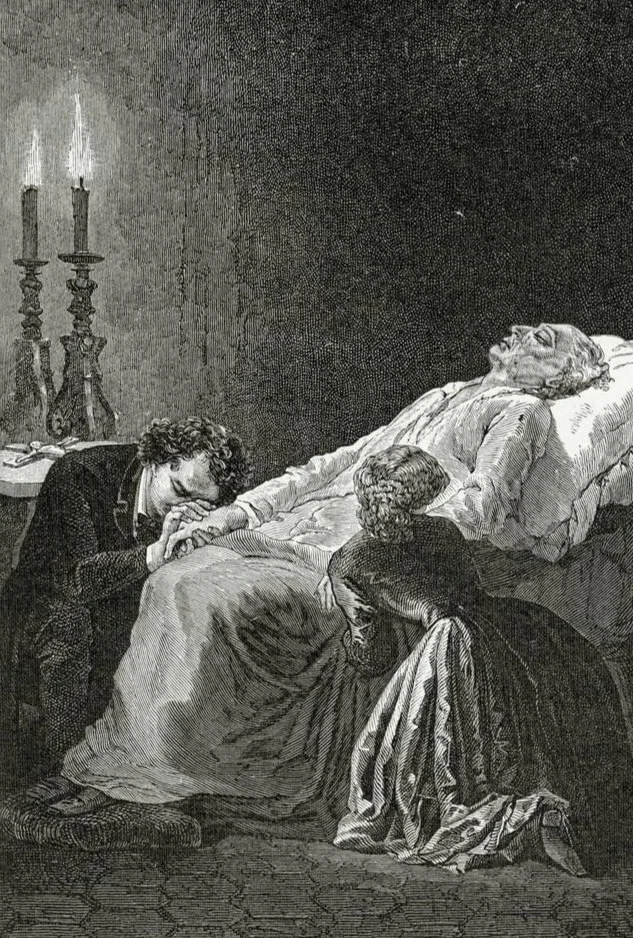Twice now, we have arrived at the original stones of La Force that remain at the corner of Rue Mahler and Rue Pavée. This spot merges the stories of Sydney Carton in A Tale of Two Cities and Jean Valjean in Les Misérables. This is the spot where Cartons accepts his end and Valjean rejects his existence.
For Carton, this streetcorner is where he begins his final walk of life. This is the place where Lucie once stood–devoutly waiting for Darnay's release. She stood outside “in all weathers” hoping he might catch a glimpse of her even for a moment. Lucie did this for fifteen-months despite never seeing Darnay through the barred windows above. Little remains of La Force today. A stone column still stands and there’s a plaque on Rue du Roi de Sicile detailing the 161 political prisoners sentenced to death, including the Princesse de Lamballe, over three days in September of 1792. I imagine Carton looking skyward on a starless night in 1793, uttering “let me follow in her steps.”
He strolled along the darker streets, tracing the path of the tumbrils carting sixty a day to Place de la Revolution. This appears as Place de la Concorde, point C, on my map. The walk down Rue de Rivoli to Rue St Honoré is about three-kilometers, leaving time for contemplation. Perhaps Carton reviewed his plan in swapping places with Darnay. Perhaps he visualized how the guillotine would slice down upon him. Perhaps he felt relief in knowing Lucie would not die with a broken heart. I’d like to think that Carton reflected on his conversation with Mr. Lorry in which he confided that his life has amounted to nothing.
“I have secured to myself the love and attachment, the gratitude or respect, of no human creature; I have won myself a tender place in no regard; I have done nothing good or service-able to be remembered by!”
Carton is haunted by a life lacking purpose. He feels that he serves no greater good. In saving Darnay, Carton can also absolve himself from his internal reckoning. He is the sacrificial lamb as Jesus was for his followers. He is the "resurrection and the life.” His words are sad and endearing. What he failed to achieve in life, he must achieve in martyrdom. His final thought before he dies…
“It is a far, far better thing that I do, than I have ever done; it is a far, far better rest that I go to than I have ever known.”
…is utterly beautiful. He has sealed his fate, and it is La Guillotine. In this treachery, there is a goodness so pure in saving Darnay and sacrificing himself. He is putting an end to others’ suffering, and also his own.
Drawing by Hablot Knight Browne
We returned to Rue Pavée to trace Valjean’s final walks too. While Carton faced a fateful decision at this streetcorner, Valjean faced guilty indecision. He bides his time on his walks to see Cosette, never taking the most direct path. From Rue de l’Homme-Armé to Rue des Filles du Calvaire, Valjean ambles to Rue Pavée criticizing what his life has become. He has lost his sense of purpose. He is devoid of his fatherhood and everything that Cosette meant to him. He always ran from his past for Cosette’s sake, and now that she isn’t around, he has lost the reason to continue running. He was a resurrected man in earlier years, upholding his promise to Bishop Bienvenu to take his silver candle sticks and become an “honest man.” The Bishop said: “Jean Valjean, my brother, you’re no longer owned by evil but by good. It’s your soul I’m buying. I’m redeeming it from dark thoughts and the spirit of perdition, and I’m giving it to God.” Valjean was now past his time of renewal. He was a convict in the eyes of the law, an afterthought in Cosette’s new life with Marius, and once again a broken man. On these walks, he could not reconcile the disparate image he saw of himself. His thoughts wavered and scattered, and his feet did the same.
“Soon he no longer came even as far as Rue St-Louis. He would arrive at Rue Pavee, shake his head and turn back. Then, he no longer went beyond Rue des Trois-Pavillions. Then, no further than Blancs-Manteaux. He was like the pendulum of a clock that does not get wound, its arc shortening until it stops altogether.”
I believe that Valjean denies himself of Cosette as punishment for his own forsaken soul. He cannot forgive himself for the man he was, running from the law and impersonating others to bury the name of Jean Valjean. His life has been one big sacrifice for Cosette and now he seeks a lonesome death. He clothes himself in the darkness that Carton wore all his life.
I see sacrifice in Carton’s death and in Valjean’s life. These men are contrastive, yet martyrs in their own right. The death that Carton chose for himself was the life that Valjean lived, and vice versa. These final walks reveal the opposing forces of will cast over these men: Carton accepting an early death to save a family and Valjean rejecting a long life to have a family. Each man is contemplative in their own way: Carton evades his own self-cynicism to stand for a greater good and Valjean embraces his inner self-hatred to remove all sense of good. Tragedy and grace walk a fine line here.
I’d like to imagine that in some space and time continuum, Carton and Valjean would have arrived at the corner of Rue Mahler and Rue Pavée in the same instant. Perhaps, they would have bumped into one another lost in their own thoughts. Their eyes would have met. In this glance, there would have been the mutual understanding of the broken and the resurrected man within one another.




























